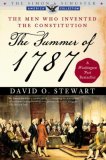Summary | Excerpt | Reviews | Beyond the Book | Readalikes | Genres & Themes | Author Bio

Critics' Opinion:
Readers' Opinion:
First Published:
Apr 2007, 368 pages
Paperback:
May 2008, 368 pages
 Book Reviewed by:
Book Reviewed by:
BookBrowse Review Team
Buy This Book
Even Adams's wary assessment implicitly acknowledged the force of Rutledge's personality. Tall, with long, powdered hair and a dignified manner, he favored "strong and argumentative" speech that "hurried you forward to the point it aimed at, with powerful impetuosity." As South Carolina's governor during its wartime occupation by the British, he was called "the Dictator." During later years as a judge, "court, jury and audience quailed before him."
Rutledge's remarks at the Convention tended to be brief and unadorned, but they were shrewdly timed. He often presented motions, or seconded motions, on central matters. A steady and persuasive force, he worked best in drawing-room conferences, committee rooms, and taverns. A member of five committees through the summer, Rutledge chaired the most important one, the Committee of Detail, which produced the first -- and in places, startling -- draft of the Constitution.
The cousins Pinckney, doomed to be confused with each other through history, were eleven years apart in age. Both led American troops but ended the Revolution in British prison camps. The elder cousin, General Charles Cotesworth Pinckney, was admired for his polish as a gentleman and maintained cordial relations with northern colleagues. A Massachusetts delegate called him "the cleverest being alive," adding, "I love him better every time I meet him." Twice the unsuccessful Federalist candidate for president, General Pinckney's contributions to the Constitution largely involved defending slavery.
His energetic relative, known simply as Charles Pinckney, was deeply engaged in the Constitution-writing process. Sometimes sharp-elbowed, as reflected in the occasional nickname of "Blackguard Charlie," Charles misstated his age so he could claim to have been the youngest delegate (a distinction held by Jonathan Dayton of New Jersey at twenty-six, three years younger than Charles). Charles then had the ill luck to have his lie uncovered.
While in the Confederation Congress in 1786, Charles chaired a "grand committee" that prepared amendments to the Articles of Confederation. He also, however, was an early supporter of a national convention to create a new charter of government. In a March 1786 speech, he said that such a Convention was the "only true and radical remedy for our public defects."
Young Charles arrived in Philadelphia with a draft constitution, something not even Madison had attempted. Charles showed his draft to any delegate who would stand still long enough to see it, and later insisted it was the model for the Constitution. This last claim triggered pointed rejoinders from the elderly Madison and even the accusation that Charles was "a sponger and a plagiarist." Charles's post hoc glory-seeking has obscured his real contributions during the Convention.
The final South Carolinian, universally referred to as Major Butler, had come to America as a British army officer in the 1760s. Marriage to a local heiress persuaded him to join those he had been sent to pacify. Like General Pinckney, Butler's contributions in Philadelphia focused on slavery questions, though he also made an impression with the ardor of his speech. More than any other, his comments are noted as "contending" or "objecting," sometimes "warmly," sometimes "decidedly," sometimes "strenuous" and even "vehement."
As the delegates straggled into Philadelphia, many met familiar faces. Some knew each other from war service; twenty-nine wore a uniform during the Revolution. Many had served overlapping terms in the Continental Congress, and since 1781 in the Confederation Congress. Nine, like Madison, simultaneously held seats in that Congress during the summer of 1787. Most shared a few occupations. Thirty-five were lawyers, thirteen were involved in trade, and twelve owned or managed plantations worked by slaves. About two dozen owned considerable (and sometimes precarious) amounts of public debt.
Copyright © 2007 by David O. Stewart





The Flower Sisters
by Michelle Collins Anderson
From the new Fannie Flagg of the Ozarks, a richly-woven story of family, forgiveness, and reinvention.

The House on Biscayne Bay
by Chanel Cleeton
As death stalks a gothic mansion in Miami, the lives of two women intertwine as the past and present collide.

The Funeral Cryer by Wenyan Lu
Debut novelist Wenyan Lu brings us this witty yet profound story about one woman's midlife reawakening in contemporary rural China.
Your guide toexceptional books
BookBrowse seeks out and recommends the best in contemporary fiction and nonfiction—books that not only engage and entertain but also deepen our understanding of ourselves and the world around us.